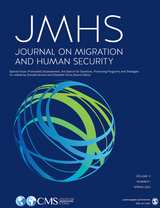
Somali refugees, informality, and self-initiative at local integration in Ethiopia and Kenya
Muhumad, Abdirahman A. / Rose JajiExterne Publikationen (2023)
in: Journal on Migration and Human Security 11 (1), 75-88
DOI: https://doi.org/10.1177/23315024231156390
Open access
As the number of refugees has continued to grow in post-independence Africa, host governments across the continent have developed stringent refugee policies that are detached from historical transborder relationships in which refugees and host communities interact. The stringent policies are underpinned by the assumption that host communities view refugees from the state-centric perspective of non-citizens as undesirable foreigners or outsiders. Host governments’ insistence that the solution lies in refugees eventually repatriating to their countries of origin drives refugee policies that undermine solutions instead of building and capitalizing on solutions generated at the level of host communities. The exclusion of local histories and social dynamics in host regions has led to policies that neither hold up to humanitarian standards nor serve their intended non-integration objectives. Some host governments are reluctant to implement local integration and have maintained exclusionary policies for a long period of time when the realities in the host communities show that refugees are included and participate in various community activities. Host governments perpetuate this disjuncture between policy and local practice by assuming or pretending that refugees will wait for repatriation instead of finding solutions in the host countries where some of them have lived for decades. Contrary to the non-integration objectives of official encampment policies and scholarship that assumes that the absence of official integration policies deters integration, many refugees have defied the stereotypical portrayal of refugees as “bare life” which denotes prioritization of mere survival as opposed to the quality of life. They have managed to find solutions and live their lives as active and productive members of their host countries. This article specifically addresses the situation of Somali refugees in Ethiopia and Kenya. It argues that the absence of local integration policies or reluctance by host governments to implement them where they exist does not automatically mean that refugees are unable to integrate in their host countries. Host government policies against integration are mediated by refugees’ self-initiative and resourcefulness.

